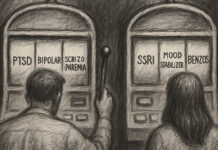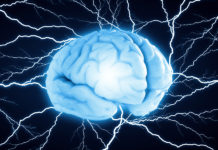Welcome to the Psychiatry Casino
Modern psychiatry is still, in many ways, closer to educated gambling than science. And patients deserve to know that.
A Place in the Forest: Mental Well-Being from a Wider Perspective
The whole social system as it is now is not designed with the purpose of well-being. Where has this gotten us?
When Validation Becomes Avoidance: The Hidden Costs of Comfort in Modern Therapy
Each week, her therapist offered affirmations and reassurance. Her eating disorder remained comfortable and unchallenged.
Mad in (S)pain
A Q&A with the team members who edit and run Mad in (S)pain: "There must be a radical change in the way mental suffering is understood and cared for."
Beliefs that Create Madness
We know that it is not simply a chemical imbalance or a broken brain. We know how the context plays a large role.
Locura en Argentina
Editor Alan Robinson aims to provide readers with a magazine that represents them and the “mad cultures” found in Argentina.
Antidepressants in Pregnancy—Turning a Blind Eye, Again
You might think that telling women about the potential risks of taking antidepressants during pregnancy would be uncontroversial.
Mad in Puerto Rico
Since Puerto Rico is, in essence, a colony of the United States, colonialism has a heavy impact on mental health and the healthcare system.
Mad In South Asia
While conducting research in rural Northern India, Ayurdhi Dhar spoke to a woman whose mother had vivid visual hallucinations of Indian wedding processions. When...
Too Good to Be True: How TMS Damaged My Brain
TMS not only has not improved my mental health, but also has robbed me of some of the most important things in life. There has been little to no research on or awareness around the negative side effects that TMS can inflict. This must change.
Mad in Ireland
Although Jennifer Hough’s older sister, Valerie, was diagnosed with bipolar disorder when she was fifteen, Hough never saw her sister as mentally ill. “To...
The Mad in the World Network: A Global Voice for Change
Mad in Ireland is the newest Mad in America affiliate. The network of affiliate sites is becoming a global voice for change.
Public Citizen, the FDA, and SSRI Safety
The safe and effective treatment for depression is psychotherapy and social support, not prescription drugs.
Therapists, Neutrality Is No Longer an Option — Politics Is Tearing Us Apart
To my fellow therapists: stop playing neutral. Stop minimizing systemic trauma to keep your comfort intact.
The Psychological Totalization of Experience: Objectification and Subjectivity
I must be a mechanistic, predictable unit, in order for a psychiatric label or a psychological variable to be implemented on me smoothly.
Narrative Reclamation: Who’s Allowed to Tell Their Story?
Narratives have the power to lock us up—sometimes literally. But they also have the power to set us free.
ECT: New Studies Detail Harms, Lack of Efficacy, Lack of Informed Consent
What people who have received ECT really think about what they were told, and about how ECT affected them.
Sober Living: Why Less Clinical Sometimes Means More Recovery
Real independence is where most people stumble. Treatment can’t replicate what it’s like to live sober in the chaos of everyday life.
Subpatterns: A Deeper Dive into Attachment Theory
Psychological issues have their roots in childhood and are linked to the attachment patterns we develop early in life.
How and Why Neurotypicals Misunderstand and Mistreat Autistic People
Commonly used autism interventions, such as ABA, have been found to be both ineffective and abusive, inflicting trauma on those subjected to them.
Veteran Suicide Prevention Legislation Introduced That Will Save Lives
The bill will require prescribers to obtain written informed consent including the risks of psychiatric drugs.
Cochrane Recommends Antidepressants for Anxiety in a Garbage In, Garbage Out Review
Cochrane's review of antidepressants for anxiety is misleading and harmful.
As a Psychologist, I’ve Seen Many Children Misdiagnosed as Autistic—It’s a Clinical Catastrophe
The ASD diagnosis glosses over the many developmental specifics that might underlie a child’s challenges related to social communication.
David Foster Wallace: Suicide and the Death of Agency
Today is the 10th anniversary of David Foster Wallace’s suicide. While it’s not fair to build an entire theory on an incredibly complicated issue like suicide around one person, Wallace’s death should challenge the common narratives around suicide — that “mental illness” causes it and that “we can’t ever know why people do it.” Both of these are self-serving platitudes that are simply not true.
Re-humanising Mental Health Systems: A Discussion with Jaakko Seikkula on the Open Dialogue Approach
Clinical psychologist, researcher, and professor Jaakko Seikkula, along with Markku Sutela, created the Open Dialogue approach to acute crises in Finland.































